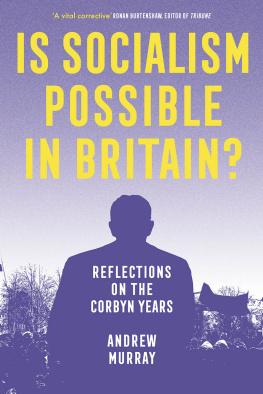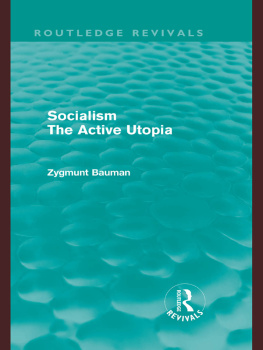
Futures of Socialism
Futures of Socialism
The Pandemic and
the Post-Corbyn Era
Edited by
Grace Blakeley

First published by Verso 2020
The collection Verso 2020
The contributions The contributors
Certain chapters have been previously published as follows: Chapter 9, If Hopes Were Dupes, Fears May Be Liars, New Socialist, 4 March 2020; Chapter 11, The Coronavirus and the Crisis this Time, Bullet, 10 April 2020; Chapter 12, Anti-Racism Requires More Than Passive Sympathy, Guardian, 8 June 2020; Chapter 14, Hunger Gnaws at the Edges of the World, Newsletter of the Tricontinental: Institute for Social Research, no. 20, 14 May 2020; Chapter 17, Making It Count: Resisting the Authority of Ignorance, Ceasefire, 10 June 2020; Chapter 25, As One of Oxfords Few Black Professors, Let Me Tell You Why I Care about Rhodes, Guardian, 12 June 2020.
All rights reserved
The moral rights of the authors have been asserted
1 3 5 7 9 10 8 6 4 2
Verso
UK: 6 Meard Street, London W1F 0EG
US: 20 Jay Street, Suite 1010, Brooklyn, NY 11201
versobooks.com
Verso is the imprint of New Left Books
ISBN-13: 978-1-83976-133-1
ISBN-13: 978-1-83976-134-8 (US EBK)
ISBN-13: 978-1-83976-135-5 (UK EBK)
British Library Cataloguing in Publication Data
A catalogue record for this book is available from the British Library
Library of Congress Cataloging-in-Publication Data
A catalog record for this book is available from the Library of Congress
Library of Congress Control Number: 2020943885
Typeset in Fournier by MJ & N Gavan, Truro, Cornwall
Printed in the UK by CPI Mackays
Contents
The last month of the 2010s dealt the British left a harrowing blow. For the second time in that decade, the Labour Party had been led into an early election by a democratic socialist leader with a radical policy platform. For the fourth time in that decade, the Party was defeated at the polls. While Corbyns Labour won a higher share of the vote in 2019 than the Party had in 2010 or 2015, the consolidation of the right around Boris Johnson saw Labour gain the fewest seats since 1935. This collection of essays by leading thinkers, campaigners and activists from throughout the vibrant socialist movement that underpinned Corbyns leadership is an attempt to learn some of the lessons of that defeat and chart a way forward for the left.
As the reader will soon discover, there remain disagreements between our contributors, which reflect divergent opinions within the wider movement. On the Partys Brexit position, the strengths or weaknesses of its manifesto and the strategic alliances that socialists should or should not have made, to name but a few issues, there is no consensus between the authors. This was a conscious decision: to have chosen contributions based on their adherence to a predetermined political line would have been to occlude real and important differences of opinion. And yet there also exists a striking degree of convergence, reflecting the powerful collective process of sense-making that has been undertaken in the short period since the election defeat. Our contributors agree on the need to strengthen and consolidate the progressive social forces that make up the wider left forces such as the labour movement, the environmental movement and the feminist and anti-racist movements, to name but a few. Most cite the importance of ongoing democratisation within the Labour Party, and the stepping up of political education outside it. All are clear that, in the UK, the US and across Europe, the socialist movement is far stronger today than it was before the financial crisis and also that we have a long way to go.
We do not have much time. As this book went to press, the world was entering perhaps the most significant social and economic crisis of our lifetimes, triggered by the spread of a novel coronavirus, declared a pandemic by the World Health Organisation in March 2020. Many of the contributors are clear that, in COVID-19, we face a unique existential threat for which our social, economic and political systems are woefully unprepared. Decades of neoliberal consensus have eroded the capacities of the state, now so desperately needed both to contain the spread of the virus and to treat those affected by it. In the UK, the weakening of our public services, our social safety net and our public infrastructure are all being exposed, as millions of workers are enduring hazardous conditions to meet the needs of those who are forced to remain at home.
The massive expansion in the size of the state necessary to deal with this crisis was immediately recognised by many of the contributors not as a progressive development an acceptance of the ideas put forward by socialists over the last several years but as a reaction by the ruling classes to the threat posed to global capitalism by the pandemic. The speed with which our political leaders acted to support finance, big businesses and the wealthy stood in stark contrast to their lagging efforts to help the selfemployed, the unemployed and the asset-poor. The long-term effects of this crisis and the state response to it are not yet clear. But if, as seems likely, the next several years witness a significant increase in market concentration as weaker firms are swallowed up by smaller ones, along with a dramatic expansion in the size of the state, we could be entering a new era of state-monopoly capitalism, under which the interests of senior politicians, financiers and corporate executives become fused into one.
How should socialists orient themselves in this age of upheaval? We have to consolidate a new popular mood of mutuality and solidarity, argues Sam Gindin, and get ourselves off the back foot. This is a moment to think more ambitiously, he insists. There is widespread agreement among our contributors that while the left eventually found positive expression in the multiple insurgent political movements that emerged in a variety of national contexts, it failed to respond constructively to the potential energy released by the last crisis, the financial meltdown of 2008. Our collective assumption that the sub-prime crisis the panic that it spread throughout the financial system and the consequent collapse of the global economy would confirm all the socialist adages about the inherent unsustainability of capitalism proved hopelessly nave. Our initial failure to translate the widespread dissatisfaction with the economic and political consensus that followed into a progressive movement for change led to the subjugation of countless millions across the world under brutal austerity regimes. Perhaps the slowness of our response, given the depths into which the movement had sunk, was to be expected. But we cannot afford to make the same mistakes again.
This book seeks, as far as is possible, to make sense of the astonishing political moment in which we find ourselves beginning with the financial crisis of 2008 and ending with the coronavirus crisis of 2020 and chart a course forward. Much as Anthony Croslands The Future of Socialism acted as a touchstone for liberals within the Labour Party over the course of the mid- to late twentieth century, we hope that this book will lay out the beginnings of a strategy for socialists to pursue, both within and outside the Labour Party, for years to come.
In the wake of 2019, commentators from across the political spectrum were quick to pronounce the final collapse of class politics. When measured according to the income and occupation-based class metrics developed in the mid- to late twentieth century, this picture checks out. The Conservatives performed better among lower-middle- and working-class (C2DE)voters in the 2019 election than it did among middle- and upper-class voters (ABC1), based on the UKs National Statistical Socio-Economic Classification (NS-SEC) schema. But such schemas completely fail to capture the transformations that have taken place in the class structure of British society since the financial crisis.
Next page











